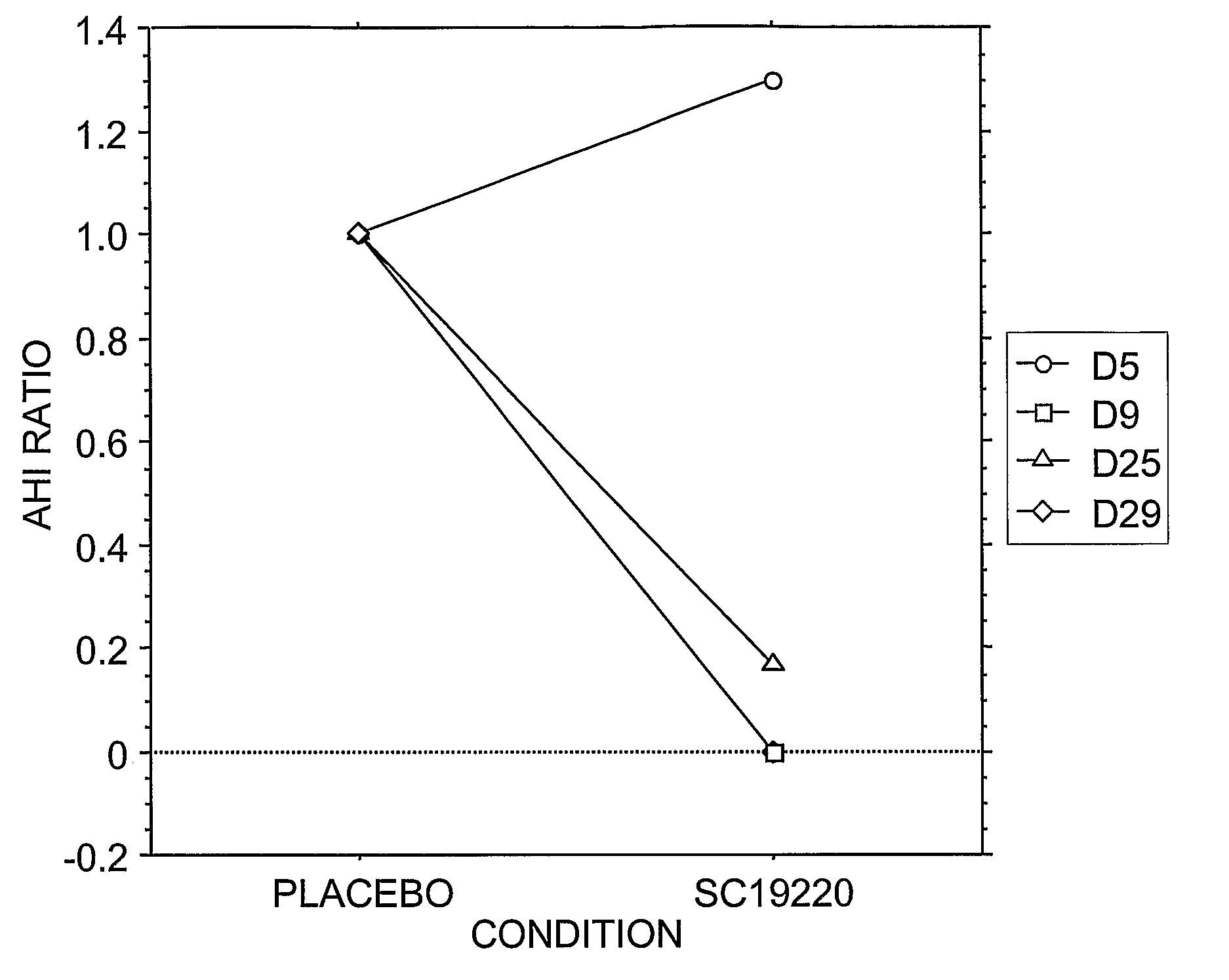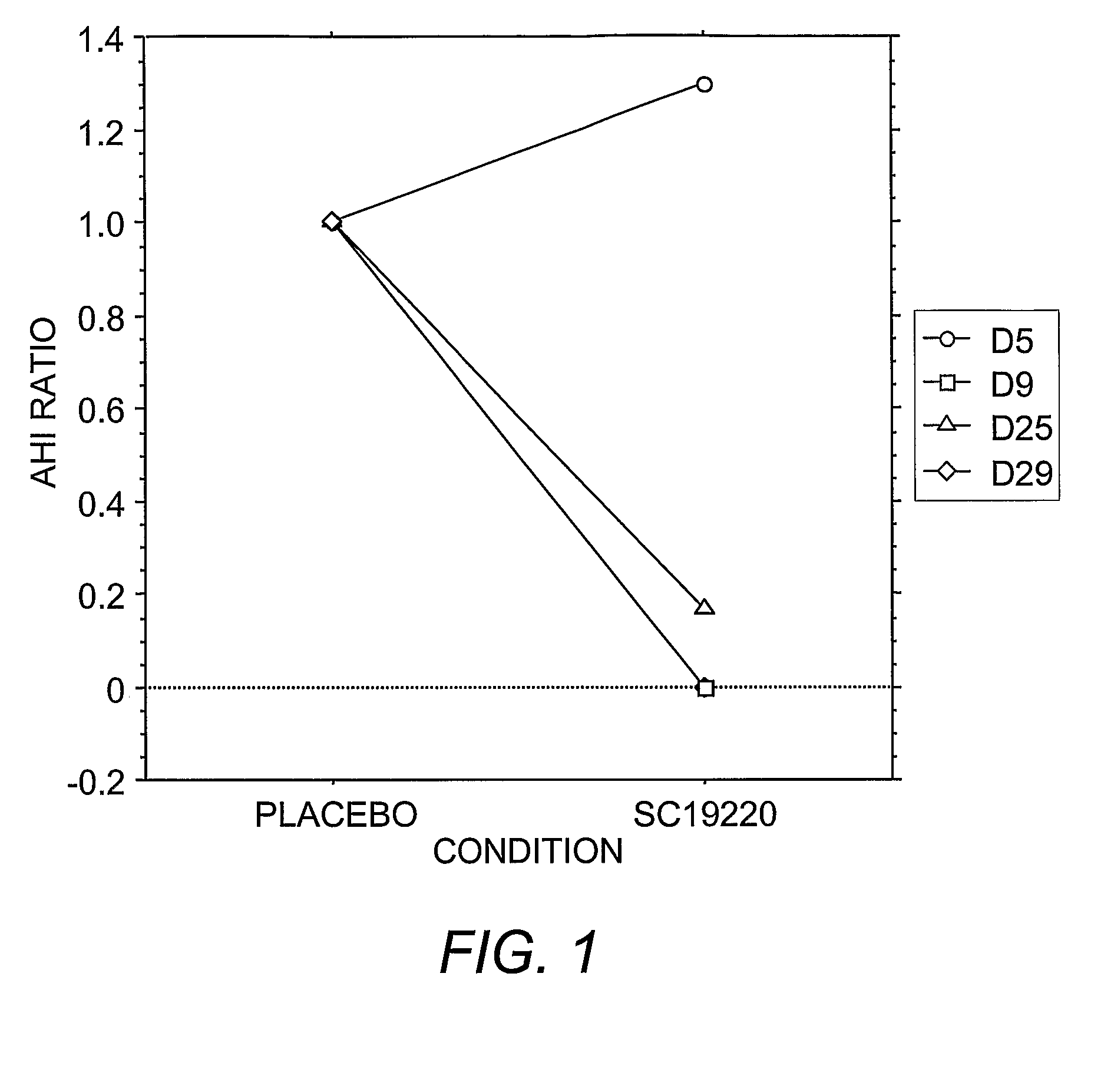Pharmacological Treatments for Sleep Disorders (Apnoe) With Prostanoid Receptor Antagonists
a technology of prostanoid receptor and sleep disorder, which is applied in the direction of biocide, drug composition, phosphorous compound active ingredients, etc., can solve the problems of excessive daytime sleepiness, substantial economic loss, employment safety issues, etc., and achieve the effects of preventing or ameliorating sleep-related breathing disorders
- Summary
- Abstract
- Description
- Claims
- Application Information
AI Technical Summary
Benefits of technology
Problems solved by technology
Method used
Image
Examples
example 1
Preparation of Animals for Physiological Testing and Recording
[0119]Adult, male Sprague-Dawley rats (obtained from Sasco-King, Wilmington, Mass.; usually 8 per test group; average weight=300 g) are maintained on a 12-hour light (08:00-20:00 hour) / 12-hour dark (20:00-08:00 hour) cycle for one week, housed in individual cages and given ad libitum access to food and water. Following the one week of acclimatization, animals are subjected to the following surgical procedures.
[0120]Acclimatized animals are anesthetized using a mixture of ketamine (80 mg / mg) and xylazine (5 mg / kg) at a volume of 1 ml / kg body weight for the implantation of cortical electrodes for electroencephalogram (EEG) recording and neck muscle electrodes for electromyogram (EMG) recording. The surface of the skull is exposed surgically and cleaned with a 20% solution of hydrogen peroxide followed by a solution of 95% isopropyl alcohol. Next, a dental preparation of sodium fluoride (Flura-GEL®, Saslow Dental, Mt. Prospe...
example 2
Physiological Recording and Suppression of Apneas
[0122]Physiological parameters (see below) from each animal prepared as set forth in Example 1 are recorded on 2 occasions in random order, with recordings for an individual animal separated by at least 3 days. Fifteen minutes prior to each recording an animal receives a systemic injection (1 ml / kg intraperitoneal bolus) of either saline (control) or an active dose of a drug treatment.
[0123]Respiration is recorded by placing each animal, unrestrained, inside a single chamber plethysmograph (PLYUN1R / U; Buxco Electronics, Sharon, Conn.; dimension 6 in.×10 in.×6 in.) ventilated with a bias flow of fresh room air at a rate of 2 L / min. A cable plugged onto the animal's connector and passed through a sealed port is used to collect the bioelectrical activity from the head implant. Respiration, EEG activity, and EMG activity are displayed on a video monitor and simultaneously digitized 100 times per second and stored on computer disk (Experim...
example 3
Induction and Suppression of Sleep Apneas
[0128]Administration of prostanoid antagonists or prostanoid agonists alone and in combination to produce respiratory responses in anesthetized animals is performed as set forth above in Example 2. An increased rate of sleep apneas after a prostanoid agonist and a blockade of this effect by treatment with a prostanoid antagonist is indicative of the therapeutic efficacy of the antagonist to treat sleep apnea and other sleep-related breathing disorders.
[0129]Overall, exacerbation of spontaneous apnea during sleep produced by peripherally administered prostanoid agonists and a blockade of this effect by prostanoid antagonists indicate a physiological role for prostanoid in regulating breathing and therapeutic efficacy of treating sleep apnea by prostanoid antagonists.
PUM
 Login to View More
Login to View More Abstract
Description
Claims
Application Information
 Login to View More
Login to View More - R&D
- Intellectual Property
- Life Sciences
- Materials
- Tech Scout
- Unparalleled Data Quality
- Higher Quality Content
- 60% Fewer Hallucinations
Browse by: Latest US Patents, China's latest patents, Technical Efficacy Thesaurus, Application Domain, Technology Topic, Popular Technical Reports.
© 2025 PatSnap. All rights reserved.Legal|Privacy policy|Modern Slavery Act Transparency Statement|Sitemap|About US| Contact US: help@patsnap.com


